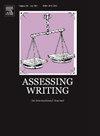Promoting cognitive engagement with peer feedback through peer review training: The case of Chinese tertiary-level EFL learners
IF 5.5
1区 文学
Q1 EDUCATION & EDUCATIONAL RESEARCH
引用次数: 0
Abstract
Peer review training is reported as an important scaffolding for students’ peer review practices in second language (L2) writing research, yet its effect on L2 learners’ cognitive engagement with peer feedback requires further exploration. This study examined the impact of ongoing peer review training on 45 Chinese EFL undergraduates’ cognitive engagement in peer reviews at a 12-week English public speaking and writing course. Drawing on multiple data, including reflective journals, written peer feedback and semi-structured retrospective interviews, this mixed-methods study found that students developed an enhanced awareness of deeper-level, content-related writing problems and peer feedback after receiving peer review training. However, understanding peer feedback occurred later than noticing writing problems. The employment of cognitive and meta-cognitive strategies varied throughout the training sessions, with initial emphasis on analyzing, evaluating, monitoring, and reflecting, and later collective incorporation of comparing and integrating. The quality of post-training written peer feedback also triangulated the enhancement of cognitive engagement. These findings extend previous research that students had deeper cognitive feedback engagement over time, by unveiling asynchronous awareness and evolving cognitive and meta-cognitive operations, and indicated the critical role of language teachers in promoting students’ cognitive engagement in peer reviews in the EFL context.
通过同伴评议培训促进认知参与:以中国大专英语学习者为例
同行评议训练是学生在第二语言写作研究中进行同行评议实践的重要框架,但其对第二语言学习者对同伴反馈的认知参与的影响有待进一步探讨。本研究考察了同行评议训练对45名中国大学生在为期12周的英语公开演讲与写作课程中同行评议认知参与的影响。利用多种数据,包括反思性期刊、书面同行反馈和半结构化回顾性访谈,这项混合方法的研究发现,学生在接受同行评议培训后,对更深层次的、与内容相关的写作问题和同行反馈有了更强的认识。然而,理解同伴的反馈比发现写作问题要晚。在整个培训过程中,认知和元认知策略的使用各不相同,最初的重点是分析、评估、监测和反思,后来则是比较和整合的集体结合。培训后书面同伴反馈的质量也对认知参与的增强起到了三角效应。这些发现通过揭示异步意识和不断发展的认知和元认知操作,扩展了先前的研究,即随着时间的推移,学生具有更深层次的认知反馈参与,并表明语言教师在促进学生在英语背景下同行评议中的认知参与方面发挥了关键作用。
本文章由计算机程序翻译,如有差异,请以英文原文为准。
求助全文
约1分钟内获得全文
求助全文
来源期刊

Assessing Writing
Multiple-
CiteScore
6.00
自引率
17.90%
发文量
67
期刊介绍:
Assessing Writing is a refereed international journal providing a forum for ideas, research and practice on the assessment of written language. Assessing Writing publishes articles, book reviews, conference reports, and academic exchanges concerning writing assessments of all kinds, including traditional (direct and standardised forms of) testing of writing, alternative performance assessments (such as portfolios), workplace sampling and classroom assessment. The journal focuses on all stages of the writing assessment process, including needs evaluation, assessment creation, implementation, and validation, and test development.
 求助内容:
求助内容: 应助结果提醒方式:
应助结果提醒方式:


